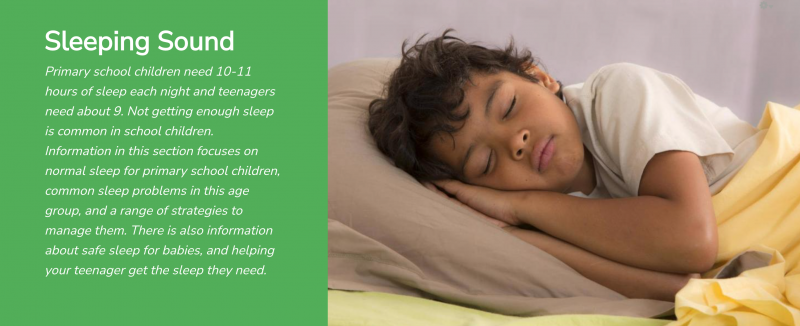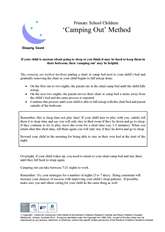Camping Out Method For Managing Sleep Problems
Camping Out Method For Managing Sleep Problems
If your child is anxious about going to sleep, then 'camping out' may be helpful. You put a chair or camp bed next to your child's bed and gradually remove the chair as your child begins to fall asleep alone.
Key points about the camping out method for managing sleep problems
- if your child is anxious about going to sleep or you think it may be hard to keep them in their bedroom, then 'camping out' may be helpful
- the camping out method involves putting a chair or camp bed next to your child's bed and gradually removing the chair as your child begins to fall asleep alone
- if your child tries to play with you, calmly tell them it is sleep time and say you will only stay in their room if they lie down and go to sleep
- reward your child in the morning for being able to stay in their own bed at the start of the night
- camping out can take between 7 to 21 nights to work
This page is about sleep in primary school children. It's part of a whole section on sleeping sound.
What is the camping out method?
If your child is anxious about going to sleep or you think it may be hard to keep them in their bedroom, then 'camping out' may be helpful.
The camping out method involves putting a chair or camp bed next to your child's bed and gradually removing the chair as your child begins to fall asleep alone.
What should I do on the first 1 to 2 nights?
Sit in a chair or camp bed until your child falls asleep.
What should I do on the next 2 nights?
Move your chair or camp bed a metre away from your child's bed and repeat the same process.
How long should I continue camping out?
Being consistent will increase your chances of success with improving your child's sleep patterns.
Continue this process until your child can fall asleep with you and the chair outside of their bedroom.
Remember: Try your strategies for a number of nights (3 to 7 days). Being consistent will increase your chances of success with improving your child's sleep patterns. If possible, make sure you and others caring for your child do the same thing as well.
Camping out can take between 7 to 21 nights to work.
What if my child tries to play?
Remember, this is sleep time not playtime! If your child tries to play with you, calmly tell them it is sleep time and say you will only stay in their room if they lie down and go to sleep. If they continue to try to play, leave the room for a short time (say 1 to 2 minutes). When you return after this short time, tell them again you will only stay if they lie down and go to sleep.
What do I do if my child comes out in the night?
Overnight, if your child wakes up, you need to return to your chair or camp bed and stay there until they fall back to sleep again.
Should I use rewards?
Reward your child in the morning for being able to stay in their own bed at the start of the night.
See more KidsHealth content on sleeping sound
This page last reviewed 16 March 2023.
Do you have any feedback for KidsHealth?
If you have any feedback about the KidsHealth website, or have a suggestion for new content, please get in touch with us.
Email us now

